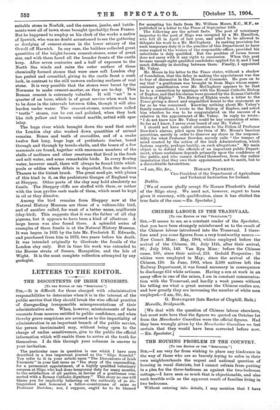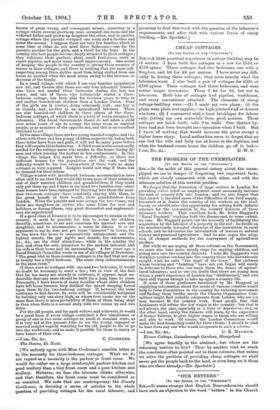THE HOUSING PROBLEM IN THE COUNTRY.
[TO THE EDITOR OP THE "SPECTATOR."]
SrD,—I am very far from wishing to place any hindrance in the way of those who are so bravely .trying to solve in their own neighbourhoods the urgent and national question of housing in rural districts, but I cannot refrain from putting in a plea for the three-bedroom as against the two-bedroom cottage,—' have seen so much that is objectionable, and also such terrible evils as the apparent result of families living in two bedrooms.
Without entering into details, I may mention that I have
known of great wrong, and consequent misery, occurring in a cottage where several grown-up sons occupied one roomand the widowed father and grown-up daughter the other, and in another cottage where the parents occupied one room and a brother and sister the second. I suppose there are very few families which at some time or other do not need three bedrooms,—one for the parents, another for the girls, and a third for the boys. In the country the best people become deeply attached to their cottages; they cultivate their gardens, plant small fruit-trees, erect or repair pigsties, and make many small improvements. One secret of keeping the people in the country is giving them security of tenure in their cottages, and there is nothing that the more self- respecting among them dislike more than being shifted from one house to another when the need arises owing to the increase or decrease of the family.
In a small village with which I am very familiar (population now 247, last Census 284) there are only four labourers' families who have not needed three bedrooms during the last ten years; and one of these, who fortunately rented a three- bedroom cottage, has been able for thirteen years to take in and mother boarded-out children from a London Union. Four of the girls are in service, doing extremely well; one boy is in Canada, and another is an agricultural labourer. There are also boarded-out children in three others of the three- bedroom cottages, of which there is a total of seven occupied by labourers. The Local Government Board do not allow a child over seven years of age to occupy the same room as married people, or as members of the opposite sex, and this is an excellent standard to set.
In the same village there are two young married couples, and two others with three and five young children respectively, but as both these latter have boys and girls, it will not be many years before they will require three bedrooms. A third room is also occasionally needed for the cottage nurse who resides in the house during ill- ness and when nursing the mother in her confinements. In this village the lodger has never been a difficulty, as there are sufficient houses for the population and the work, and the difficulty would be far less everywhere if there were as many cottages as were required. Lodgers would not stay if there was no demand for their labour.
Village women with insufficient bedroom accommodation have often said to me that they would like to see more of their relations, and of their married children and grandchildren, if they could only put them up, and I have in my mind two families who—since their houses have been enlarged by throwing into them the next- door two-room cottages—have constantly staying with them, to the great benefit of their health, their grandchildren from London. When the parents and sons occupy the two rooms, and there are daughters in service who come home for rest and holidays, or during illness, very great discomfort and unpleasant- ness are experienced.
If a good class of labourer is to be encouraged to remain in the country, it must be possible for him to house his children decently, sometimes to see and entertain his married sons and daughters, and to accommodate a nurse in illness. It is no argument to say he does not get these "luxuries" in towns, for in the town the home is comparatively unimportant, and the lighted streets, the gay sights and sounds, the amusements, &c., &c., are the chief attractions ; while in the country the first, and often the only, attraction to the modern labourer and his wife is their home and its surroundings. A few years ago a Rural District Councillor wrote to me of six villages in Berkshire: "The great blot in these country cottages is the fact that not one in twenty has a third bedroom. The sexes sleep indiscriminately in the same room."
If there were no cottages with one and two bedrooms, it would no doubt be necessary to erect a few ; but in view of the fact that far too many are already in existence, it appears most un- desirable that any more should be built for a long time to come. Personally, I have known of many families whose elder children have left home because they disliked the mixed sleeping forced upon them by the two-bedroom cottage. If, however, the same continues to find favour, its evils will be considerably mitigated by building only one story high, as where four rooms are on the same floor there is more probability of three of them being slept in than when there is a second story with two rooms up and two down.
For the old people, and for aged widows and widowers, it would be a great boon if every village contained a few almshouses or group of one or two room cottages at small or nominal rents, as it is very sad at the present time to see the young engaged or married couples eagerly watching for the old people to die or go into the workhouse, and so make it possible for them to marry or have homes of their own.
The Downs, St. Neots.
[We entirely agree with Miss Cochrane's sensible letter as to the necessity for three-bedroom cottages. What we do not regard as a necessity is the parlour or front room. We would far rather see a large comfortable parlour-kitchen and good scullery than a tiny front room and a poor kitchen and scullery. However, we fear the labourer thinks otherwise, and that, therefore, the front room must be considered as an essential. We note that our contemporary, the County Gentleman, is devoting a series of articles to the whole question of providing cottages for the rural labourer, and promises to deal this week with the question of the labourer's requirements, and after that with various forms of cbeato building.—ED. Spectator.]











































 Previous page
Previous page